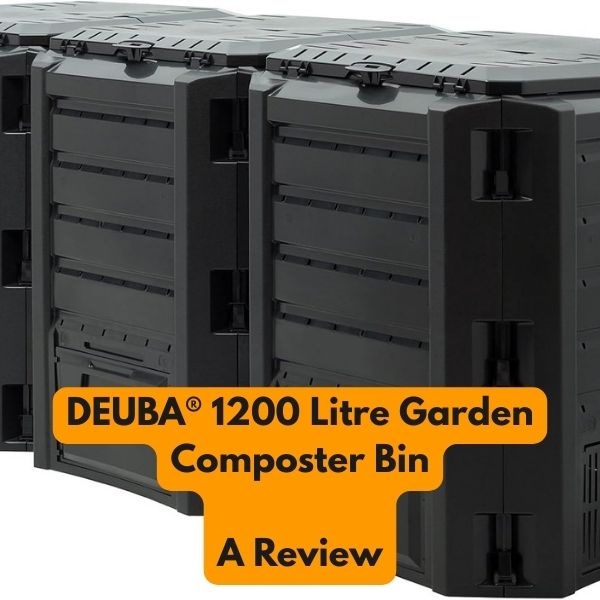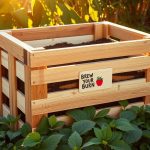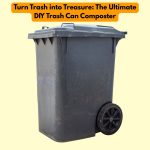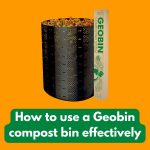Turning food scraps and garden waste into something beautiful and useful sounds a bit like magic. With composting, anyone can do it—from a kid with a small garden patch to a family keen on greener living.
The DEUBA® 1200 Litre Garden Composter Bin helps make this possible.
Here’s a friendly, down-to-earth look at what sets this compost bin apart, how it works, and why it might be a good fit for your home.
The Heart of the Bin: Composting Made Simple
The DEUBA® compost bin holds a massive 1200 litres, so it’s ready to tackle garden cuttings, old veggies, or even dog dirt.
This size is perfect for families or gardening fans who want the most from their leftovers. If you ever wondered about making your own soil booster or keeping food scraps out of the bin, this is an easy place to start.
This bin does more than just collect waste. It harnesses the science of composting, where billions of tiny living things—like bacteria and earthworms—break down waste and transform it into nutrient-rich compost.
This compost works wonders for your garden soil or potted plants. It’s nature’s recycling system put into a neat, weatherproof shell.
Why Choose the DEUBA® Composter Bin?
Reduces Waste at Home
Household waste is a problem everyone deals with. The DEUBA® composter cuts down on how much your family throws out.
Toss in kitchen scraps such as fruit peels, vegetable trimmings, eggshells, and coffee grounds.
You can also add garden trimmings, leaves, and yes—dog waste (as long as you keep composting guidelines in mind).
Over time, these scraps will transform. Instead of ending up in a landfill, they’ll become rich fertilizer for your flowers or vegetable patch.
You can get tips on what kitchen waste belongs in your compost by checking out the Don’t Toss It Campaign, which explains how to recycle food scraps easily and safely.
Eco Friendly and Sustainably Designed
Making your own compost is rewarding. You’ll stop buying heavy, plastic-wrapped soil bags from the garden center.
You’re creating a closed loop in your garden—feeding the soil, not the landfill.
Plus, composting is a key way to cut down on climate-harming gases, since less food waste rots in dumps.
Designed for Everyday Use
A hinged lid at the top means it’s simple to lift and add new material. The hatch near the base is for removing finished compost, so you never have to dig through the whole pile.
The bin’s black color helps attract heat, which kicks the bacteria into high gear. Multiple side vents keep fresh air flowing, and this steady oxygen is crucial for fast composting.
The DEUBA® is also tough.
Since it’s weatherproof, it will sail through rain, sun, or snow without falling apart or getting stinky. Use it all year.
Composting, Worms, and More: What You Can Do
You can make more than one type of compost in the DEUBA®. Try regular composting with garden waste and food scraps.
Or, set up a small worm farm or experiment with vermicomposting, which means letting worms help break down food even faster.
Either way, soon you’ll have fluffy, dark compost ready to boost your plants.
A compost tumbler is another style of bin. It’s a good option if you only have food scraps, want the fastest results, or like the idea of mixing compost by spinning.
The DEUBA® is stationary, but its large open design and vents help air do a lot of the work.
If you want to see how compost tumblers compare, check out the guide to the Compost Tumbler for Sale, which gives a clear look at their benefits.
Dimensions and Assembly
At 78x28x33 inches, the 1200L DEUBA® bin is roomy, but its shape fits well along garden walls or out-of-the-way corners.
If you need different sizes, the company offers options from 380L up to 1600L, so you can match your composting habits to your space.
Assembly is tool-free and uses a click system, so even if you don’t love DIY projects, you’ll have it ready in minutes.
Just snap the panels into place and start composting straight away.
Science Made Easy: How Compost Happens
Composting is like baking a cake for your soil. You mix the right ingredients: “greens” (like food scraps, coffee grounds, and fresh lawn clippings) and “browns” (dry leaves, shredded paper, cardboard).
Get the balance right, and microbes start feasting—and heating up the pile too! Heat helps good bacteria thrive, and worms join in, munching and mixing as they go.
That’s why the DEUBA®’s vents matter—they keep the pile from turning soggy or smelly.
Finished compost looks dark, crumbly, and smells earthy.
When you use it in your garden, you send plant roots a feast of nutrients.
It’s one of the best, simplest things you can do to help your plants and your eco footprint.
If you want to learn about different composting strategies that don’t need fancy gadgets, check out Six effective composting methods.
These techniques can build your composting confidence, especially if you want to try combining bins and outdoor piles.
Who Should Buy This?
If you have a decent-sized outdoor space, the DEUBA® 1200L model is a solid pick. It’s great for families with gardens, allotments, pet owners (for dog waste), those who cook at home a lot, or anyone who wants to recycle more and waste less.
Even if you’re not a “gardener,” having homemade compost is handy—use it for potted plants, lawns, flower beds, or to help friends and neighbors grow too.
It’s big and open enough to start a vermicomposting project, do classic composting, or use as storage for leaf mulch.
If you want to try out different composting techniques as the seasons change, you’ll enjoy its flexibility.
For tips on how seasons can affect compost, pop over to the Composting calendar guide.
FAQs
Can you compost dog waste?
Yes, you can, but follow guidelines.
Keep dog dirt separated from compost intended for food crops. For ornamental plants or non-edible gardens, you’re fine. High heat and letting the pile age will help kill germs.
How long before I get finished compost?
It depends on what you add and the weather. Warm months: about 2-4 months with regular mixing.
Cooler months: up to 6 months. Stir with a fork or shovel to speed things up, or try a special compost tumbler for faster results.
Will it smell?
Not if you keep air moving and balance your greens and browns.
The side vent holes help a lot. Avoid adding meat, dairy, or cooked food, which attract pests and cause bad smells.
Is the bin easy to set up and clean?
Yes. Assembly is fast, thanks to the click system. It’s made of tough plastic and is easy to rinse out if needed.
How do I use the finished compost?
Mix it into your garden beds, scatter on lawns, use for flower pots, or blend into your vegetable patch.
Compost makes the soil richer, helps plants grow, and holds water better—so you won’t need to water as often.
Pros and Cons
Pros:
- Huge 1200L capacity—enough for active households or serious gardeners.
- Handles lots of different waste types: kitchen scraps, dog waste, garden clippings, and more.
- Simple, toolless set-up—no sweat, no tools lost in the grass.
- Weather-resistant for outdoor use all year round.
- Easy-to-use hatch door for removing compost, plus hinged lid for filling.
- Vents for air make for quicker, less smelly compost.
- Saves money: no need to buy bagged compost or fertilizer.
- Helps the environment by reducing landfill waste and methane gas.
- Great for both composting and vermicomposting (worm composting) projects.
Cons:
- Large size might be too much for small city patios or balconies.
- Needs some space and a flat surface outdoors.
- Stationary design: turning/mixing compost must be done with a tool, unlike a compost tumbler which you spin.
- Black plastic can heat up a lot in direct sun—good for composting, but you might want to keep it partly shaded in very hot climates.
- Not rodent-proof—keep meat and dairy out, or add extra mesh at the base if wildlife is curious.
Value for Money
The DEUBA® 1200 Litre Garden Composter Bin stands out when you look at what you get. You save money almost immediately by making your own compost.
No more plastic-wrapped, store-bought soil every season. It turns everyday waste and garden trash into a steady stream of garden gold.
Because it’s sturdy and weatherproof, it should last for years—even in the roughest weather. You’ll likely only need to buy it once, which saves money in the future. Its generous size means you won’t have to hunt for a separate food caddy or small bin.
The compost produced from one season can be enough for a full-size garden.
For the price, you get a straightforward, durable compost bin that cuts down on waste, supplies free fertilizer, and spreads the composting habit across your home and neighborhood.
Many users find it pays for itself in less than a year if you garden often.
Final Thoughts
Composting is science, but it’s also just common sense. With the DEUBA® 1200 Litre Garden Composter Bin, everything’s set up to make getting started about as easy as it gets.
You pull kitchen and garden scraps out of the trash, feed them to the composter, and enjoy the results in a few months.
It doesn’t take fancy skills—just the willingness to keep adding new scraps and mixing now and then.
For anyone with outdoor space and the desire to help the planet (while also giving their garden a treat), this compost bin makes the job friendlier, cleaner, and more rewarding. Curious about more composting methods or running into trouble?
Visit the How to Start Composting home guide for beginner-friendly tips and troubleshooting.
In the end, the DEUBA® 1200L Composter is a practical, eco-friendly way to recycle kitchen and garden waste—turning what used to be trash into one of your garden’s biggest treasures.
Give it a go; the earth (and your plants) will thank you.








